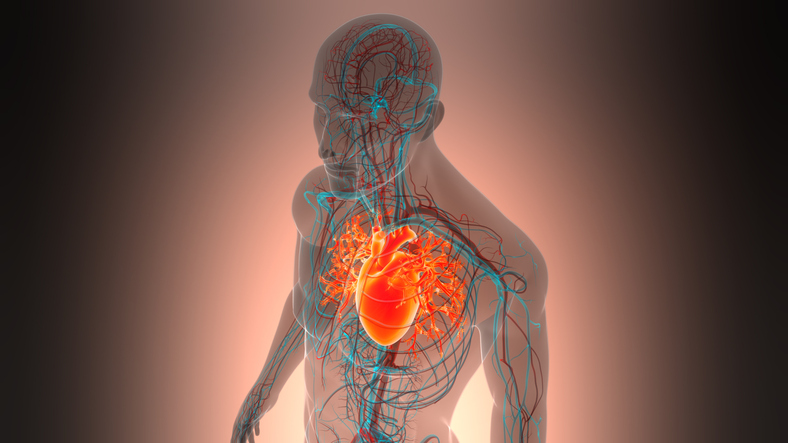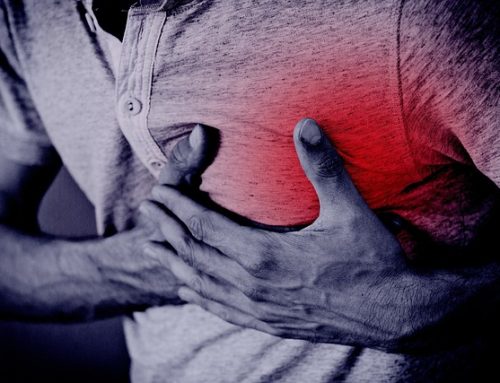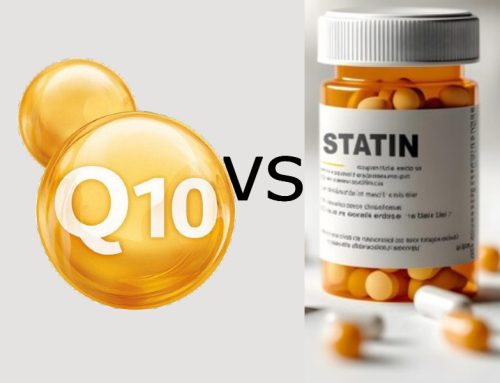Good heart health depends in part on adequate intakes of Coenzyme Q10 and selenium. Combining CoQ10 supplements with selenium supplements gives a theoretical advantage when both substances are used in an intervention. The KiSel-10 clinical trial has shown that, compared to placebo, the combined supplementation in an elderly population resulted in reduced risk of cardiovascular mortality, better heart muscle function as seen in echocardiography, and lower circulating levels of the NT-proBNP biomarker for heart failure risk [Alehagen & Aaseth 2015].

In the years 2003-2010, Prof Urban Alehagen and colleagues enrolled 443 elderly Swedish citizens in the KiSel-10 clinical trial. They randomly assigned 221 to the CoQ10 and selenium group and 222 to the placebo group. They investigated the effect on heart health.
The daily dosage for the four-year study was 2 times 100 mg Coenzyme Q10 in the ubiquinone form and 200 mcg selenium from selenium-enriched yeast. The average age of the community dwelling study participants was 78 years [Alehagen & Aaseth 2015]. At the start of the study, the study participants had, on average, deficiency-level serum selenium status (67.1 mcg/L) and somewhat low serum CoQ10 status (0.82 mg/L). By the end of the four-year intervention, the average serum selenium status had increased to 210.3 mcg/L. The average serum CoQ10 status at the completion of the study was 2.17 mg/L [Alehagen 2020].
Outcomes of the Combined CoQ10 and Selenium Intervention
The researchers used Structural Equation Modelling to investigate the statistical inter-relationships between the following biomarkers and the impact on heart health [Alehagen 2022]:
- inflammation
- oxidative stress
- endothelial dysfunction
- fibrosis
- insulin-like growth factor 1
- expression of microRNA
The SEM analysis showed that the significant reductions in biomarkers of oxidative stress and inflammation were first-order factors in improving heart health. These factors, in turn, formed a second-order factor called inflammation/oxidative stress. The second-order factor influenced the factors fibrosis and myocardial function. The end result was improved heart muscle function and reduced risk of cardiovascular mortality [Alehagen 2022].
Heart Health Benefits of Combined CoQ10 and Selenium Supplementation
Sub-study analyses of the blood samples from the KiSel-10 trial have shown the following heart health benefits:
- reduced plasma levels of the von Willebrand factor and the plasminogen activator inhibitor-1, both bio-markers for endothelial dysfunction [Alehagen 2020b]
- increased plasma levels of insulin-like growth factor-1, attenuating an age-related decline in IGF-1 concentrations [Alehagen 2017]
- prevented an increase in D-dimer levels, which are associated with increased risk of thrombotic disorders [Alehagen 2021]
- associated with significant changes in metabolic profiles and with significant changes in the pentose phosphate, the mevalonate, the beta-oxidation, and the xanthine oxidase pathways [Alehagen 2019]
- associated with significant changes in circulating microRNA [Alehagen 2017b]
- associated with less shortening of leukocyte telomere length [Opstad 2022]
- associated with increased serum SIRT1 concentrations [Opstad 2023]\
- influenced the aging-related biomarkers in an anti-aging direction compared to placebo [Alehagen 2023]
- resulted in significantly improved renal function [Alehagen 2020c]
- associated with beneficial effects on thyroid hormones [Alehagen 2024]
Conclusion: Coenzyme Q10 and Selenium and Heart Health
Preventive agent
The outcomes of the KiSel-10 clinical trial suggest that combined Coenzyme Q10 and selenium supplementation can a preventive agent in relation to cardiovascular disease [Alehagen 2013].
Safety
With respect to safety, Mantle found that none of the more than 400 randomized controlled clinical trials of supplementary Coenzyme Q10 listed in Medline has reported any significant adverse events in either the short or long term [Mantle 2023].
In a 2021 review, Schomburg reported that the dosages that can cause acute selenosis are far higher than the recommended amounts of selenium provided by supplements and used in clinical studies. According to his analysis, up to 200 mcg of supplementary selenium per day has proven safe, regardless of the selenium form used [Schomburg 2023].
Bioavailability
Of particular note is a 2019 comparative bioavailability study conducted by Lopez-Lluch et al. The study results showed the absorption and bioavailability of Coenzyme Q10 in supplements varies considerably, depending upon the manufacturer’s formulation process. Important factors are the CoQ10 crystal dispersion status, the type of carrier oils, and the composition of other excipients. Moreover, the study showed that the formulation of the supplement is more important than the form of the Coenzyme Q10 used, i.e., whether ubiquinone or ubiquinol [Lopez-Lluch 2019: Mantle & Dybring 2020].
A 2014 comparative study has shown that selenium-enriched yeast supplements but not pure selenomethionine supplements are associated with reductions in biomarkers of oxidative stress. This finding suggests that selenium species other than selenomethionine account for the decrease in oxidative stress [Richie 2014].
Sources
Alehagen U, Johansson P, Björnstedt M, Rosén A, Dahlström U. Cardiovascular mortality and N-terminal-proBNP reduced after combined selenium and coenzyme Q10 supplementation: a 5-year prospective randomized double-blind placebo-controlled trial among elderly Swedish citizens. Int J Cardiol. 2013 Sep 1;167(5):1860-6.
Alehagen U, Aaseth J. Selenium and coenzyme Q10 interrelationship in cardiovascular diseases–A clinician’s point of view. J Trace Elem Med Biol. 2015;31:157-62.
Alehagen, U., Johansson, P., Aaseth, J., Alexander, J., & Brismar, K. Increase in insulin-like growth factor 1 (IGF-1) and insulin-like growth factor binding protein 1 after supplementation with selenium and Coenzyme Q10. A prospective randomized double-blind placebo-controlled trial among elderly Swedish citizens. Plos One. 2017;12(6):e0178614.
Alehagen, U., Johansson, P., Aaseth, J., Alexander, J., & Wågsäter, D. Significant changes in circulating microRNA by dietary supplementation of selenium and Coenzyme Q10 in healthy elderly males. A subgroup analysis of a prospective randomized double-blind placebo-controlled trial among elderly Swedish citizens. Plos One. 2017b;12(4):e0174880.
Alehagen U, Johansson P, Aaseth J, et al. Significant changes in metabolic profiles after intervention with selenium and Coenzyme Q10 in an elderly population. Biomolecules. 2019;9(10):553.
Alehagen U, Aaseth J, Alexander J, Johansson P. Supplemental selenium and coenzyme Q10 reduce glycation along with cardiovascular mortality in an elderly population with low selenium status. Journal of Trace Elements in Medicine and Biology. 2020:61:126541.
Alehagen U, Alexander J, Aaseth J, Larsson A, Lindahl TL. Significant decrease of von Willebrand factor and plasminogen activator inhibitor-1 by providing supplementation with selenium and coenzyme Q10 to an elderly population with a low selenium status. Eur J Nutr. 2020b Dec;59(8):3581-3590.
Alehagen U, Aaseth J, Alexander J, Brismar K, Larsson A. Selenium and Coenzyme Q10 supplementation improves renal function in elderly deficient in selenium: observational results and results from a subgroup analysis of a prospective randomised double-blind placebo-controlled trial. Nutrients. 2020c Dec 9;12(12):3780.
Alehagen U, Aaseth J, Lindahl TL, Larsson A, Alexander J. Dietary supplementation with selenium and Coenzyme Q10 prevents increase in plasma D-dimer while lowering cardiovascular mortality in an elderly Swedish population. Nutrients. 2021;13:1344.
Alehagen U, Johansson P, Svensson E, Aaseth J, Alexander J. Improved cardiovascular health by supplementation with selenium and coenzyme Q10: applying structural equation modelling (SEM) to clinical outcomes and biomarkers to explore underlying mechanisms in a prospective randomized double-blind placebo-controlled intervention project in Sweden. Eur J Nutr. 2022 Sep;61(6):3135-3148.
Alehagen U, Alexander J, Aaseth JO, Larsson A, Svensson E, Opstad TB. Effects of an intervention with selenium and Coenzyme Q10 on five selected age-related biomarkers in elderly Swedes low in selenium: results that point to an anti-ageing effect—a sub-analysis of a previous prospective double-blind placebo-controlled randomised clinical trial. Cells. 2023;12:1773
Alehagen U, Alexander J, Aaseth JO, Larsson A, Opstad TB. Supplementation with selenium and coenzyme Q10 in an elderly Swedish population low in selenium – positive effects on thyroid hormones, cardiovascular mortality, and quality of life. BMC Med. 2024 May 7;22(1):191.
López-Lluch G, Del Pozo-Cruz J, Sánchez-Cuesta A, Cortés-Rodríguez AB, Navas P. Bioavailability of coenzyme Q10 supplements depends on carrier lipids and solubilization. Nutrition. 2019 Jan;57:133-140.
Mantle D, Dybring A. Bioavailability of Coenzyme Q10: An Overview of the Absorption Process and Subsequent Metabolism. Antioxidants (Basel). 2020 May 5;9(5):386.
Mantle D & Martin S. CoQ10: a key supplement for mitochondria and more. Ihcan-mag.com. 2023 Nov;20-23.
Opstad TB, Alexander J, Aaseth JO, Larsson A, Seljeflot I, Alehagen, U. Selenium and Coenzyme Q10 intervention prevents telomere attrition, with association to reduced cardiovascular mortality—sub-study of a randomized clinical trial. Nutrients. 2022;14:3346.
Opstad TB, Alexander J, Aaseth J, Larsson A, Seljeflot I, Alehagen U. Increased SIRT1 concentration following four years of selenium and Q10 intervention associated with reduced cardiovascular mortality at 10-year follow-up—sub-study of a previous prospective double-blind placebo-controlled randomized clinical trial. Antioxidants. 2023:12:759.
Richie JP Jr, Das A, Calcagnotto AM, Sinha R, Neidig W, Liao J, Lengerich EJ, Berg A, Hartman TJ, Ciccarella A, Baker A, Kaag MG, Goodin S, DiPaola RS, El-Bayoumy K. Comparative effects of two different forms of selenium on oxidative stress biomarkers in healthy men: a randomized clinical trial. Cancer Prev Res (Phila). 2014 Aug;7(8):796-804.
Schomburg L. Selenium deficiency due to diet, pregnancy, severe illness, or covid-19—a preventable trigger for autoimmune disease. Int J Mol Sci. 2021;22:8532.
The information presented in this review article is not intended as medical advice. It should not be used as such.









Leave A Comment